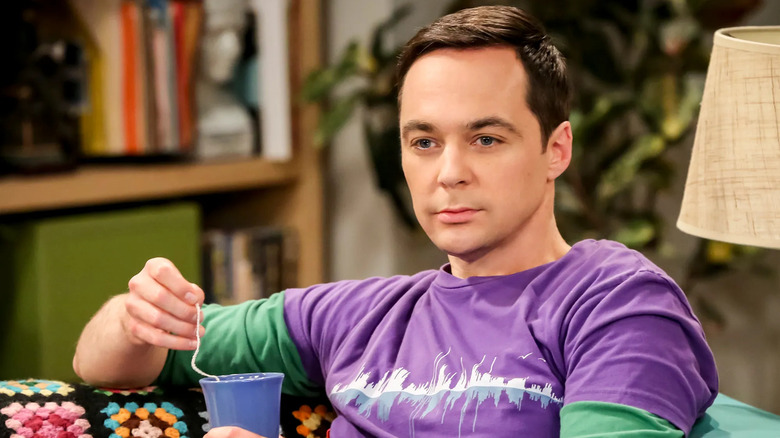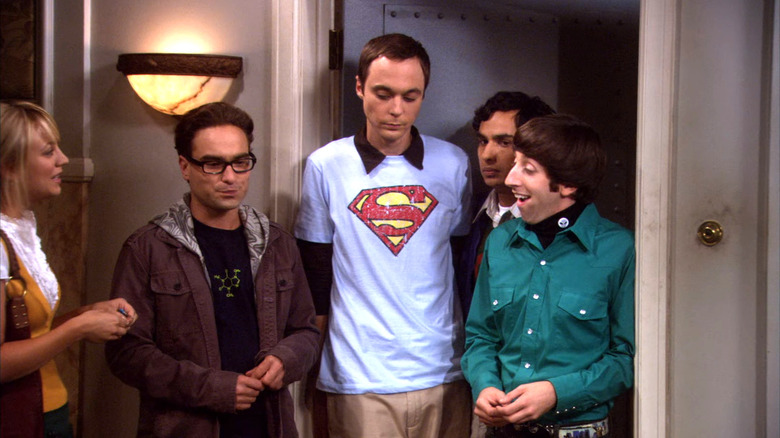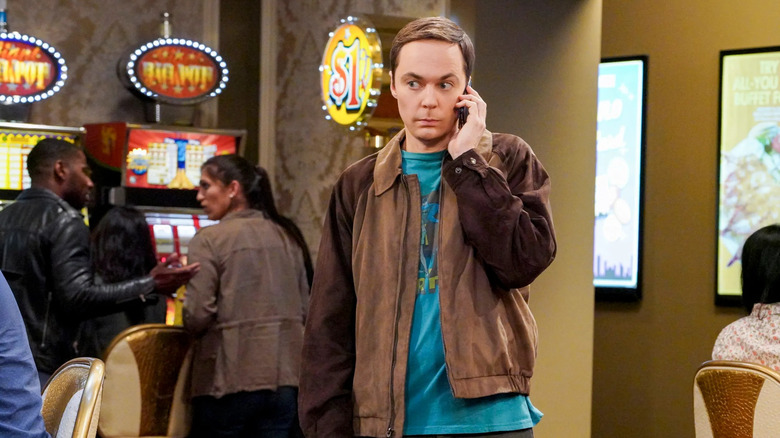Why The Big Bang Theory Avoided Clarifying One Thing About Sheldon Cooper
We may receive a commission on purchases made from links.
Sheldon Cooper, the ostensible protagonist of "The Big Bang Theory" played by Jim Parsons, is definitely unique as far as sitcom leads go. Sure, he's surrounded by fellow eccentrics and nerds like Leonard Hofstadter (Johnny Galecki), Howard Wolowitz (Simon Helberg), and Raj Koothrappali (Kunal Nayyar) — and he's often challenged by the dynamic presented by the group's women Penny Hofstadter (Kaley Cuoco), Bernadette Rostenkowski-Wolowitz (Melissa Rauch), and his eventual wife Amy Farrah Fowler (Mayim Bialik). Still, a question has loomed for years about Sheldon: is he meant to be on the autism spectrum?
Sheldon is certainly neurodivergent; his brain quite clearly works differently than, say, Penny's or even Leonard's, and he does exhibit stereotypical symptoms of autism, as many have noted throughout the years. In fact, in Jessica Radloff's 2022 book "The Big Bang Theory: The Definitive, Inside Story of the Epic Hit Series," the journalist points out that, when the cast of "The Big Bang Theory" attended their first San Diego Comic-Con, Adam Savage — who hosted "Mythbusters" at the time — openly asked if Sheldon was diagnosed with [Autism Spectrum Disorder]. Parsons, as Radloff said, explained that he wasn't sure.
Though Chuck Lorre — who created "The Big Bang Theory" alongside Bill Prady — did originally intend to make Sheldon asexual, he's quite clear in Radloff's book that Sheldon was never actually supposed to be on the spectrum canonically. Why? It's complicated. "We did not want to put a label on Sheldon, because with that comes a responsibility of authenticity ... which should be respected," Lorre explained.
As Lorre explained, they chose not to formally diagnose Sheldon to give Parsons more room as an actor and, it seems, out of respect for the autistic community. "I think not having a label gave Jim a great deal of more freedom to play the part as he wanted to play it, as opposed to how we might have been pressured to do for a very-real syndrome that can be difficult," Lorre said to Radcloff.
Steve Molaro, who worked as a writer and executive producer on the series, agreed: "Sheldon was never diagnosed, and it was nice that he didn't have that label, because like anybody on the spectrum, they should be able to just be who they are." One important note here is that on "Young Sheldon," the first major spin-off of "The Big Bang Theory," the character doesn't receive an official diagnosis either, so this decision by Lorre and Molaro — who both worked on that series too — is canon.
Jim Parsons seems to think that Sheldon Cooper is on the autism spectrum
It's complicated for Jim Parsons, too, which is perfectly understandable! "I took it as the writers wanting to celebrate and utilize certain aspects of someone on the spectrum, but were not interested in carrying the responsibility they would feel," Parsons mused in Jessica Radloff's book. "I mean, just getting the science right was enough of a responsibility."
Not only that, but Parsons said he would rethink whether or not he should have even played Sheldon if his diagnosis was defined on the series. "But looking at where we are today in the world, would you have needed to then find someone on the spectrum to play that part? Now that being said, who's to say I'm not on the spectrum in some way?" Parsons asked. "I'm not saying I am, but it's called the spectrum for a reason — I just may not be at a notable point on it! I don't know. That's the whole point in some ways."
Still, Parsons also said that he did his own studying of the autism spectrum and came to his own conclusion. As he put it:
"But at the time, the more I read up on [Autism Spectrum Disorder], I was like, 'Well, the writers can say no, but Sheldon sure has a lot of the same traits!' I think he was probably based on someone Bill Prady knew, who was probably on the spectrum, and many of the traits that this other individual had made them such a remarkable and unique person to base a character on."
Parsons is absolutely correct about this; Sheldon Cooper and Raj Koothrappali are both based on one guy Prady once knew, actually. At the end of the day, though, Parsons thinks the character is bigger than any diagnosis. "I don't think that most people — no matter what they are, or what disabilities they have — spend the majority of their time, if any, talking about it," he said.
"But regardless, it was just such a gift that Sheldon had all these off-centered ways of looking at things and doing things, because it opened up so many possibilities for how he could react to any given situation," Parsons concluded. This is true, and Sheldon is also important from another perspective: representations of neurodivergent people on the small screen.
No matter what, Sheldon Cooper has helped viewers understand the autism community
So what do other people involved with "The Big Bang Theory" think about Sheldon's non-diagnosis? Former Warner Bros. executive Peter Roth, who was heavily involved with the series, weighed in and told Jessica Radloff that he definitely believes Sheldon is on the spectrum. "Sheldon was definitely on the spectrum, there's no question about it," Roth said. "And Steve Molaro wrote Sheldon with a wisdom and an insight and a compassion that really defined the character."
Roth also shared something personal that explains his connection to Sheldon Cooper. "My wife and I have an autistic daughter, and while Sheldon is very different from her, I've certainly found myself drawn to him, rooting for him, and loving him," Roth revealed. "The special needs of the character is something that enabled me to relate and, or more importantly, to root for." Not only that, but Roth pointed to one of the best relationships on the entire show to prove Sheldon's neurodivergence: "It's one of the reasons I was always so touched by Sheldon and Penny's relationship. As annoying as Sheldon was, Penny accepted him and loved him."
"I remember thinking that it was cool that we had a character who was clearly on the spectrum," former executive vice president of comedy development Wendi Trilling told Radloff. "We weren't saying it, but we were kind of celebrating it and him, and making it okay to be different."
"I can't tell you how many times a parent would bring their son or daughter to set and say, 'I'd love for you to meet him,' followed by, almost as a warning, 'He's a lot like Sheldon.' I would always say, 'Yeah, we get it! It's fine, really. We understand,'" Bill Prady said in the book.
Still, he, like Lorre, wants it to remain undefined. "There was never a conscious decision, as far as I'm aware, to not say what Sheldon's diagnosis is," he continued. "It's clear that he's not neurotypical. I think there's a certain responsibility when you say, 'This is this kind of diagnosis.'"
"We preferred that Sheldon was simply Sheldon," Prady said, which does, at the end of the day, make sense; Sheldon is entirely himself and, while he's clearly not neurotypical, he makes people feel seen. "There were some things about him that would seem spectrum-y, but you would discover, in fact, a real and logical reason and warrant, and then some things that were not."
"The Big Bang Theory" is streaming on HBO Max now.


